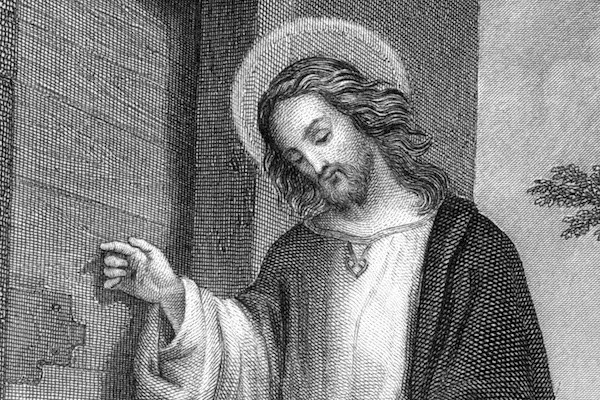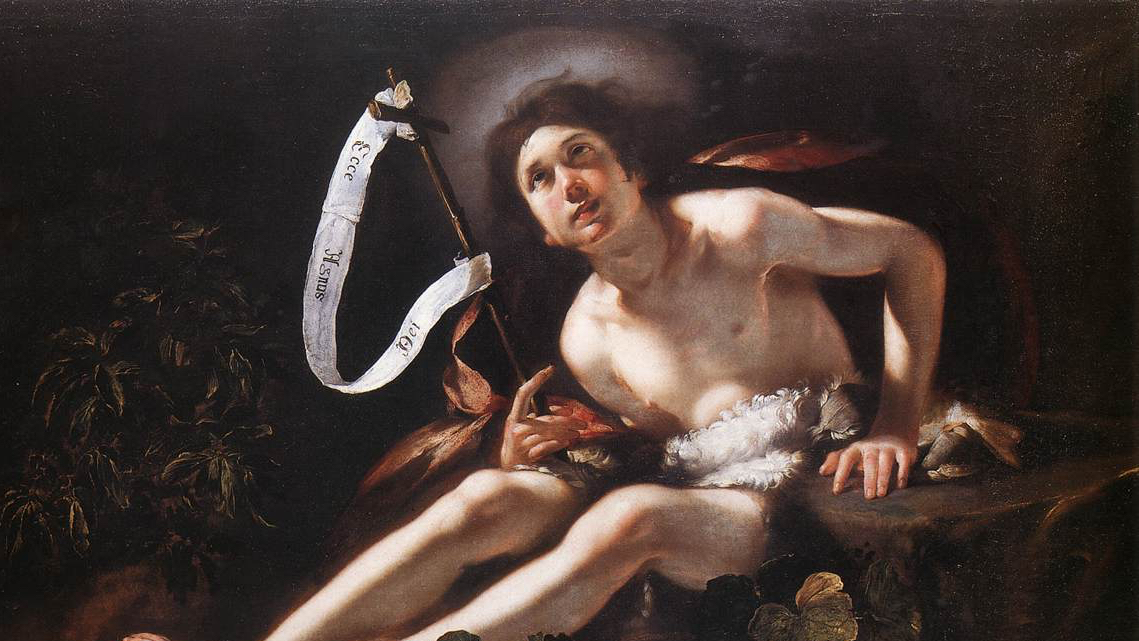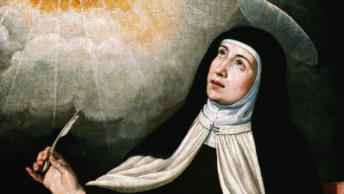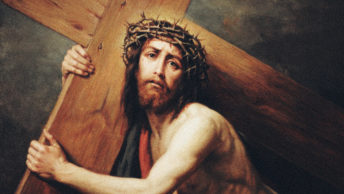
The Gospel of Matthew (11:25-30) tells us about the Heart of Jesus. It gives us these words of comfort: “Come to me all you who labor and are burdened and I will give you rest. Take my yoke upon you and learn from me for I am meek and humble of heart and you will find rest for yourselves. For my yoke is easy and my burden light.”
What do these words tell us about the Lord? What do they mean for us?
They tell us something about God that is very different than the images of God we might have. Many of our images are of the Almighty Awesome Creator of the Universe. We think of the great frescos on the ceiling of the Sistine Chapel as Michelangelo portrayed God creating the universe with a dazzling display of power. We think of the image of creation of Adam, and God’s powerful hand touching the limp finger of the first man giving him life. Or we think of some of the wonders of nature we may have experienced: the summits of the Rocky Mountains, the great canyons of Arizona, or the fire red skies of a Tampa Bay Sunset. And we remember that God is the Awesome Creator.
But He is more than this.
We often have images of God as the Judge of the living and dead. He is the One we will have to come before and present the work of our lives, not just the individual things we have done, but how well we have allowed His love to permeate the world. There is reward or punishment waiting, there is mercy and compassion, but there is also justice. Again, going back to the Sistine Chapel, Michelangelo depicts the scene of the Last Judgment showing the joy of the saved and the grief of the condemned. Jesus is the Just and Merciful Judge.
But He is more than this.
Jesus is meek and humble of heart. The prophet Zechariah prophesied that this is how our King would come to us. (Zechariah 9:9). And this is how Jesus presents himself in the Gospel, meek and humble of heart. What does it mean to be meek? To be meek is to be patient and gentle. It is not the surrender of rights or some form of cowardice, but the opposite of sudden anger, of malice and of long harbored vengeance. Jesus is meek. He is not waiting for the right time to strike us down for what we have done to Him, how we have attacked His Holiness with our sins, how we have attacked those whom He loves, or how we have put him out of our lives. He is gentle. He is patient with us.
Chapter 6 of the Book of Revelations presents the Four Horsemen of the Apocalypse. This is in the section of the seven seals. A white horse comes forward and its rider is given a crown and called on to continue the victory of the Lord. A red horse is summoned, and its rider told to let people slaughter each other in their continual and unending wars. Then the Black Horse comes and its rider has a scale as people are afflicted with famine, and finally a sickly green colored horse comes. Its rider is Death. When the fifth seal is opened, prayers are heard from under God’s altar. There, under the altar, are the souls of all those who have been slaughtered for giving witness to the Lord. These are the martyrs. Peter and Paul are there. St. Ignatius of Antioch and all those thrown to the lions and killed by the Romans are there. As are those throughout history who have died giving witness for Christ, tortured to death throughout the world. The sixteen Carmelite nuns of Compiegne are there. They were beheaded during the French Reign of Terror, singing Veni Creator Spiritus as they were murdered youngest to oldest before a hushed crowd. The North American martyrs are there, St. Isaac Jogues, St. John DeBrebeuf and all who were slaughtered by the American Indians. Those who died in Baghdad for daring to be Catholic are there. You may not have heard about this. It doesn’t fit into the media’s agenda for determining our thought. On October 31, 2010 as a Catholic community in Baghdad was celebrating the vigil Mass of All Saints, Moslem militants burst into the Church and began shooting. During the chaos that followed, one priest tried to hide children in the reconciliation room. He was caught, taken to the center of the Church and shot, dying in his mother’s arms and praying, “Into your hands I commend my spirit.” Two nuns who were trying to hide the women were also killed. A second priest was told to turn away from the Cross, and turn to the East and proclaim that Allah is God. He refused to do so and was killed. A total of 58 joined those under the altar of God, adding their voices to the thousands and thousands before them who call out, “How long will it be, holy and true Master, before you sit in judgment and avenge our blood on the inhabitants of the earth.” “Be patient for a little while longer,” they are told. More will be added to your number. More will have the chance to choose the Lord.
When we say the Lord is meek, we do not mean that He is submissive. We mean that He is so full of love that He is willing to be patient. Perhaps some of the Moslem cowards of Baghdad will have the opportunity to join the martyrs they created and give witness to Christ.
Jesus is humble of heart. A proud person sees the universe revolving around him or her. If there is an offense, the proud person refuses to forgive. “Who does he think that he is?” the proud person asks. He or she is not concerned with returning the sinner to love. His or her only concern is with vengeance, getting the sinner back for the offense. That is not the way of the Lord. He is humble of heart. His concern is not with how He has been offended. His concern is with the sinner and returning him or her to love.
What does all this mean to us? It means that we need to give Jesus our burdens. This is more than the difficulties of life, sickness, marriage or family problems, etc. Yes, we give these to the Lord, but there is more than this that He wants. He wants us to give Him all that is keeping us from Him. Perhaps there are sinful hidden closets in our lives. We are ashamed. Perhaps there is some form of substance abuse. Perhaps there is some form of sexual immorality. Perhaps we have difficulty forgiving those who have hurt us. Maybe we have committed serious sins. We had an abortion or we convinced another to have an abortion. Often we are not as afraid of bringing our sins to the priest in confession, as we are afraid that God is never going to forgive us. We have attacked Him, willingly and knowingly. How can we seek forgiveness? So we think that we are condemned to go through life carrying these burdens only to wait for everlasting punishment after we die. “No,” the Lord says, “Give me your burdens, come to me for I am meek and humble of heart.” He is saying, “I am not so offended that I am shutting off mercy and compassion. I am not concerned about myself. I am concerned about you. I suffered on the cross for you. Give me your burdens. I want them, no matter how ugly, how messy they may be.”
And then the Lord says, “And you will find rest for yourselves, for my yoke is easy and my burden is light.” The burden of being a Christian, as demanding as it is, is light next to the burden of carrying our sins to the grave and beyond. Following the way of holiness, being separate from what others consider normal life, is so much easier than being part of the crowd that exalts in its immorality. Holiness is being different. Holiness is accepting the way of the Lord.
I am sure that you have heard this quote from Pope Emeritus Benedict XVI many times, but it bears repeating: “The world offers you comfort. But you were not made for comfort. You were made for greatness.” Every one of us was created for greatness. To achieve this greatness means that there are times that we have to reject the comfort of the world. There are times that we have to be are out and out uncomfortable. We are mocked for our faith and our morality. We are mocked for our refusing to live for ourselves. We are mocked because we know that marriage is sacred and live that way. We are mocked because we know that we have to avoid certain associates, certain places, certain parties, etc because we know that they can destroy us. We are mocked because we are not part of the crowd. This is not comfortable. But we were not created for comfort. We were not created to be part of the crowd. We were created for greatness. That is the burden, that is the yoke, that Jesus calls us to accept in today’s Gospel.
It is so much easier to carry the burden of the Lord then to carry the burden of sin.
“Come to me all you who labor and are burdened and I will give you rest. Take my yoke upon you and learn from me for I am meek and humble of heart and you will find rest for yourselves. For my yoke is easy and my burden light.”








